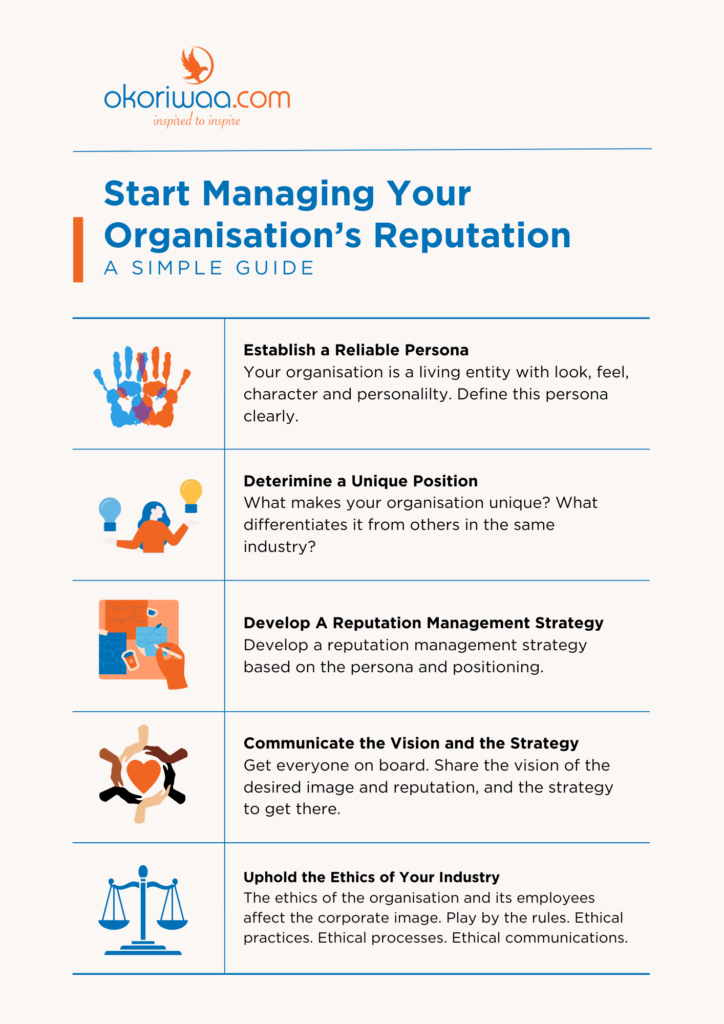Corporate reputation management is an important concern for any corporate organisation or business entity, be it public or private, large or small. The main reason it cannot be disregarded or taken lightly is because, in a sense, it has implications for the fiscal and social success of an organisation. In this article, I will look at what corporate reputation is, why it is important, and some steps to take to manage the reputation of your organisation or business.
What Is Corporate Reputation?
An entity’s reputation, whether it is a person, a group of people, or an organisation, is an opinion about the entity that is usually the outcome of social assessment based on a set of criteria. Reputation is a part of an entity’s identity, as seen by others.
Corporate reputation is how a business or organisation is perceived by its patrons and allies (stakeholders). Examples are customers, employees, vendors, contractors, investors and potential investors, competitors, the community in which the organisation operates, and the general public. Corporate reputation is the public’s view of the organisation, rather than the organisation’s view itself.
What Is Corporate Reputation Management?
Corporate reputation management is the practice of influencing how people see your corporate brand. It entails taking steps to shape what people think of and how they feel about the organisation. The goal of corporate reputation management is to establish and maintain a favourable public image for the organisation.
Corporate reputation management involves monitoring public perceptions of the organisation, devising strategies to create a positive image, responding appropriately to diverse information about the organisation, especially malicious and negative information, and generating and maintaining goodwill for the organisation. To accomplish this, an organisation needs to conduct all aspects of its operations in a way that is consistent with the perceptions it wishes to cultivate. That is a sure way to boost its foremost intangible asset: its reputation. Organisations use research and perception data to monitor and improve reputation.

What Corporate Reputation Can Do To Your Organisation
Reputation can either make or break the bottom line of a company. It can either boost or kill sales, put off or attract business and investment partners, deter or attract qualified and efficient talent, influence regulators and legislators. Additionally, establishing and maintaining a good corporate reputation enhances your brand visibility and builds trust and credibility. Your corporate reputation literally touches every member of your listening public.
In the connected digital era of today, corporate reputation management has taken on even greater significance. Every day, more people are using the internet. As more individuals use the internet to keep up with global events, your organisation owes it to itself to:
- Monitor public perceptions and opinions (online and offline)
- Tell its story in a way that supports its ideal image, and resonates with its audience
- Engage in activities to create a positive image within and outside the organisation
Warren Buffet said, “It takes twenty years to build a reputation and five minutes to ruin it. If you think about that, you’ll do things differently.” To come up on top in a competitive environment, investing in establishing and maintaining a positive corporate reputation is fundamental.
A Simple Guide to Start Managing Your Organisation’s Reputation
Establish a Reliable Persona
What many people do not realise about corporate organisations is that, to a certain extent, society views them as living entities (represented by their employees, management, and board). Regardless of the operation or goals of a corporate organisation, the populace that uses it, expect to see some good qualities, much like a person they would want to associate with. Your organisation needs a stable face. Descriptive characteristic that spells out the nature and personality of the entity or corporate brand. Is your corporate brand a happy-fun brand, a nurturing brand, a strict professional brand, or easy-going? Do some research and work with your team to establish a persona. The persona influences how the organisation positions itself, what it says and does, and what people expect of it.
Determine a Unique Position
The second thing that must be done is to define a positioning. In an increasingly commoditized business environment, what sets your business apart? What makes your organisation unique? Your unique position would let your audience know what value to expect from their interactions with your organisation. Your goal is to show your customers and audiences how you deliver the same service (or product) as your competitors in your unique way, demonstrating real value. The positioning, together with the persona, are the foundations of the organisations communications with both internal and external publics, and the expectations of its divers publics.
Maintain Absolute Ethics
There is no shortcut to creating or maintaining a good corporate reputation. The ethics of the organisation and its employees have serious consequences for the corporate image. Playing by the rules is essential. Ethical practices. Ethical processes. Ethical communications. Whether the organisation is dealing with customers, vendors, or employees, maintaining high ethical standards at all times will boost its reputation. These stakeholders are the primary carriers of word-of-mouth for your organisation. The role of word-of-mouth in establishing and maintaining a positive reputation cannot be underestimated. When the organisation does things the right way, people notice and talk. When it does things the wrong way, people notice, and talk even more, and loudly.
Develop A Reputation Management Strategy
It is said that failing to plan is planning to fail. Develop a strategy and an implementation plan to build and maintain the right reputation for your organisation. Your Public Relations or Corporate Communications unit, together with other key personnel, can create a simple and effective reputation management strategy. The strategy must be shared broadly in the organisation to get everyone on board. Remember, the actions of employees inside and outside the organisation affect the organisation’s reputation. Adjust the strategy periodically to keep it current with the changing needs of your organisation.
Note the following steps as you develop your corporate reputation strategy:
- Identify all issues that affect your reputation (reputation audit)
- Analyse each of the issues to find out the past, the present, and future state of those issues
- Develop strategy options to change or maintain reputation based on audit
- Select strategy options that will be the most efficient and effective for the issues identified
- Create an action plan based on the selected option(s)
- Implement the plan
- Evaluate, refine, or change the strategy
Work With an Agency
To keep up with the hyper-speed of work and information flow in the digital environment, partnering with a communications agency is the best decision your company can make for its reputation management. An agency will provide external, big picture perspective. Agencies can help you achieve your corporate PR objectives more quickly and effectively by leveraging their diverse brand experiences. Contact okoriwaa.com for a free consultation on managing your corporate reputation.
Pay Attention to Service and Efficiency
To establish and maintain a good reputation, an organisation must deliver on its promises to internal and external publics. If for any reason, it cannot deliver on its promises, it must immediately communicate with the affected parties. Your organisation (and its representatives) should not wait for the affected parties to ask for feedback before giving it. Proactive communication shows that the organisation values the party or parties involved.
Finally, Keep a 'Stern' Friendship with Other Organisations
I say ‘stern’ friendship because it differs from a social friendship. What it means is that other organisations might help keep your organisation afloat in rough times. Maintain a cordial friendship with other organisations in your industry within the boundaries of professionalism and business ethics. This concept is especially important when you need the services of said corporations to function. When you create such ethical friendships, even your competitors begin to trust you, or at least, envy you.
Conclusion
In conclusion, always keep your focus on optimising your process and pleasing your diverse stakeholders (patrons and the public), and your organisation’s reputation will start taking the right shape. Develop and implement the right strategy to amplify, and consolidate the emerging reputation.

Perry P. K. Ofosu is an accomplished public relations practitioner and university administrator. He worked as the registrar for the Ghana Institute of Journalism and the Catholic Institute of Business and Technology. Perry is a former Vice President of the Institute of Public Relations (IPR) and an adjunct lecturer at Central University, Pentecost University, and Jayee University College. He is currently an associate consultant at okoriwaa.com.




